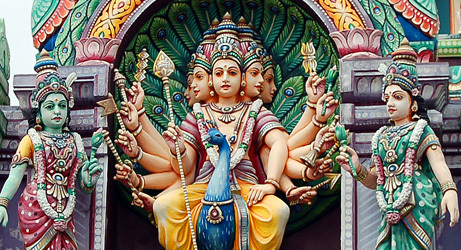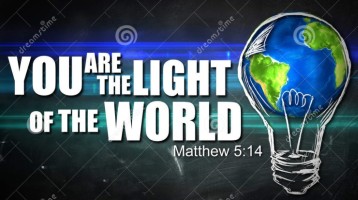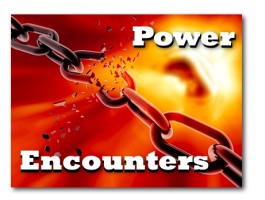16. World Views in Collision (ii)
In the last lesson and this one we describe some of the clashes that occur between the Christian world view and other (non-Christian) world views. We considered, first, how this occurs in relation to history and eschatology.
A Clash in Mission
The second "clash" we will look at concerns our views about "mission", reaching the world with our message.


Christianity is a missionary faith
Jesus was the ultimate missionary. Everyone who met Him had to make a decision, about Him and His claims and message:
"Therefore everyone who confesses me before men, I will also confess him before my Father who is in heaven. But whoever denies me before men, I will also deny him before my Father who is in heaven." (Matthew 10:32)
Jesus' came with a mission: to redeem the world and give us life (Luke 19:10; John 10:10). Non-Christians find it difficult to come to terms with the incarnation:
- philosophers ridicule worshipping a mere man instead of immaterial God
- Jews and Muslims believe that the coming of God in human flesh would limit Him
- secular humanists want man, not God, to be the centre of everything; the idea that we need God to come and rescue us is at odds with this
- Hindus believe that we are already part of God
- Marxists assert that the proletariat are at the centre and reject religion entirely
- atheists believe that God does not exist, so how can he become one of us
Jesus' message divided people. Love for him, and obedience to His call would trump all other relationships. No neutrality or ambiguity would be possible. Christ demanded total allegiance of His disciples:
"Whoever does not take up their cross and follow me is not worthy of me." (Matthew 10:38)
"Whoever does not carry their cross and follow me cannot be my disciple." (Luke 14:27)
"You will be hated by all because of my name" (Matthew 10:22)
"To this you were called, because Christ suffered for you, leaving you an example, that you should follow in his steps." (1 Peter 2:21)
Jesus called people to believe in Him and follow Him unconditionally, then take His message to the rest of the world.
Christians are commissioned/commanded to "make disciples of all nations" (Matthew 28:19). This inevitably causes conflict, with other faiths, social orders and belief systems.
"These men who have caused trouble all over the world have now come here." (Acts 17:6 - Thessalonica)
"In the past God overlooked such ignorance, but now he commands all people everywhere to repent. For he has set a day when he will judge the world with justice by the man he has appointed. He has given proof of this to everyone by raising him from the dead." When they heard about the resurrection of the dead, some of them sneered, but others said, 'We want to hear you again on this subject.' At that, Paul left the Council. Some of the people became followers of Paul and believed. Among them was Dionysius, a member of the Areopagus, also a woman named Damaris, and a number of others. (Acts 17:18-21)
How is this clash over mission manifested today?
- outright rejection of the message and messengers
- intellectual disagreement and derision
- legal restrictions, such as closed borders (many), "anti-proselytization" (eg Israel) and anti-vilification (eg Australia) laws
- spiritual attacks (especially when Christianity displaces traditional communal systems or household gods)
- visual, eg in the arts
- politicisation of the message, to subvert and co-opt it for secular ends
- pressure to tone down the message, so as not to cause cultural offence
- persecution, martyrdom
The quest for winning the world continues. Conflict often emerges because missionaries ask those they meet to give up their traditional belief systems in favour of the "introduced" one.


Case Study
Dr Graham Staines, 58, an Australian, was director of a Leprosy Mission in Baripada, Orissa, India, and translator of the New Testament into the Ho tribe language. He spent 35 years of his life helping the poor and illiterate in India.
Just after midnight on 23 January 1999, Graham (who was attending a jungle Bible camp in the village of Monoharpur) was sleeping in his jeep with his two sons, Phillip, 10, and Timothy, 6 in Orissa. The jeep was attacked by Hindu nationalists, who broke its windows and poured petrol over and into the car, then set the fuel alight; the jeep was enveloped in flames. The charred bodies of Graham and his two boys were subsequently found embracing one other. A few days later, his wife, Gladys offered a public statement forgiving the killers. In 2003, the Hindu activist Dara Singh was convicted of leading the gang. (Graham was a cousin of the trainer of this course.) World views collide. Evangelise and disciple the unsaved - and count the cost.
Islam is another missionary religion. Islam does not separate church and state but seeks global dominion in God's name. Christianity believes that "Utopia" does not lie in creating a perfect new world; our hope is in God and eternity. The commitment of both faith systems to winning the same world guarantees ongoing conflict.
"This paranoid Islam, which blames outsider, 'infidels', for all the ills of Muslim societies, and whose proposed remedy is the closing of those societies to the rival project of modernity, is presently the fastest growing version of Islam in the world." (Salman Rushdie)
Only the work of God in us can help us get rid of wrong assumptions and develop a genuine Christian missiology and way of thinking:
"... in your light we see light." (Psalm 36:9)
Authority, Power Encounters
The third clash we will look at concerns authority and what happens when powers collide.
Who is in charge? Which God or gods matter? Christians are called to be people of influence. This often brings us into conflict with secular and religious authorities.
Some Christians create clashes through negligence, arrogance. We can be "right" in what we believe and assert, but still alienate others. Pray for wisdom.
What is your God like?

Vengeful? |

Dualistic? |

Polytheistic |
Thinking "God's way" can be dangerous, problematic, depending on "who" our God is:
- an angry, vengeful God > Jihadism, Inquisition
- one among many > polytheism
- a God who is absent > Deism
- a God who is selective, has favourites > Judaism
- like Papa Smurf > antinomianism
- a puppet master, deterministic, capricious > Islam
- distant, cannot come near us > Dualism
- legalistic, judgemental, first and foremost > legalism
- a nationalistic symbol(s) > Hindu nationalism
- an idea, a principle > Enlightenment
- a God who gets involved, is incarnational > Christianity
- redemptive; punishes sin but takes the initiative, reaches out and redeems the sinner


Disappointing?
Developing theologies around issues can also be problematic, depending on each person's views about:
- who is God?
- what are the source(s) and limits of truth?
- what is sin?
- was/is Jesus God, or man, or both?
- are we "saved" (define) by faith or works, religion, signs, miracles, rituals?
- do we only get one shot at, then face eternity?
- why is there so much pain, suffering and injustice in the world?
- where is God when I need Him?
- why do bad things happen to good people?
- why does nothing seem fair?
Every person you encounter will have a worldview, through which they interpret reality; there must be billions of world views.
- who is right when soldiers fight on opposite sides of a war believing God supports them?
- "our denomination" is within the Bible belt
- confuse material well-being with rewards, blessing, God's favour
- confuse the Christian community with political preferences, parties
- confuse legalism with Godly living
- it is enough to live by the Golden Rule, "don't hurt anyone", look after family, be there for the needy, go through the motions, leave "religious" topics to the experts
- we are the chosen people, predestined by God, or Providence (Deistic approach)
- who cares about God, religion, ritual, liturgy, and all the rest?
- life is tough; the important things are: work hard, get by, leave the world a better place
- "Life is hard, and then you die" fatalism; without God and without hope in the world
- get all you can; there are no limits, restraints or rules
The Christian world view is one among many. We are called to let our lights shine in the darkness (Matthew 5:16), to draw attention to Christ.

Christian living and world evangelisation lead to clashes with "authority". We should not be surprised when we get push-back, opposition.
The Apostles were not intimidated. Their boldness can be ours as we trust the Holy Spirit to be in us and give us confidence to live for Christ.
As a Christian pastor, Martin Luther King Jr confronted racism in white churches in the American South; he called on them to become more Christian. King knew that the answer to racism and violence was genuine Christianity. He gained his inspiration from Jesus who said that those who follow him must turn the other cheek, love their enemies and pray for those who persecuted them. King's leadership of the civil rights struggle showed how love could triumph over hate.
Power Encounters in the Bible
Power encounters involve human and non-human actors. The Biblical record is one of ongoing encounters between spiritual enemies, involving spiritual warfare, signs, wonders and miracles.

God performed signs and wonders to convince Pharaoh of His sovereign reality (Acts 7:26).
In the days of Elijah, God demonstrated himself by fire to show himself as superior over the religion and prophets of Baal (1 Kings 18). God used Naaman's healing (through Elisha) to prove that no god in all the world was equal to Him (2 Kings 5:15).
In the days of Daniel, God spared the three Hebrews to cause Nebuchadnezzar to recognize His sovereign power (Daniel 4:2). Daniel was spared from the lions so that Darius would be convinced that God reigns (Daniel 6:27).
The life of Jesus was full of power encounters.
- His birth challenged the rule of Herod, who sought to kill Him and caused Joseph to take his family and flee to Egypt.
- The temptation was a power encounter, a replay of the very first temptation.
- The interactions He had with religious leaders (see John 8:31-34), political leaders, Roman authorities, the forces of nature, sickness, demonic oppression and death were power encounters.
- Gethsemane was a power encounter over self-preservation.
- The cross was a power encounter (John 13:2; 1 Corinthians 2:8).
- The resurrection was a power encounter (Acts 2:24; Revelation 1:18).
The coming of the Holy Spirit was a power encounter (Acts 1:8).
On the day of Pentecost, Peter reminded the masses that the ministry and message of Jesus was attested to by signs, wonders, and miracles (Acts 2:22). Signs and wonders were performed by the apostles immediately after the day of Pentecost (Acts 2:22, 43).
The believers prayed: "Sovereign Lord... enable your servants to speak your word with great boldness. Stretch out your hand to heal and perform miraculous signs and wonders through the name of your holy servant Jesus" (Acts 4:24-30). Stephen the deacon (who was martyred) and Philip the evangelist performed signs and wonders (Acts 6:8; 8:6).
Signs of power were present as Paul, Barnabas and Silas went on missionary journeys. They were used (on the island of Cyprus) to silence the opposition of Elymas the sorcerer, so amazing the Roman Pro Consul Sergius Paulus that he believed, "he was amazed at the teaching about the Lord" (Acts 13:12). When Paul and Barnabas addressed the Jerusalem Council, they told how God had used signs and wonders among the Gentiles. When Paul's authority as an apostle was challenged, he recounted that he had preached the gospel freely, suffered for the gospel, and performed signs and wonders among them (2 Corinthians chapters 11 and 12). Miracles were not uncommon in the early church.

World evangelisation is not just a matter of intellectual persuasion, winning debates, changing people's opinions, or convincing them to become like us. In many cultures spiritual encounters involve real struggles. Biblical descriptions of the climax of history represent major power encounters.
The Apostles were not intimidated (though they had every reason to feel so, naturally speaking) - they knew that God (in them) was stronger than those in the world (1 John 4:4). Their boldness can be ours as we trust the Holy Spirit to be in us and give us confidence to live for Christ. Christian living and world evangelisation lead to clashes with "authority". We should not be surprised when we get push-back, opposition.
So what about those militant, war-like terms we discussed in the last lesson?
The New Testament describes the Christian life metaphorically as a battle to be fought and a war to be waged. Timothy was told to "wage a good warfare" (1 Timothy 1:18), to "fight the good fight of faith" (1 Timothy 6:12), and to "endure hardship as a good soldier of Jesus Christ" (2 Timothy 2:3). Paul described his ministry as a "fight" (1 Corinthians 9:26; 2 Timothy 4:7).
Peter tells us that Satan is like a lion seeking to "devour" Christians (1 Peter 5:8). We are told to "put on the whole armour of God" (Ephesians 6:11-17). Christians use "weapons" in a "warfare" (2 Corinthians 10:4). Non-Christians are said to be "alienated from God" and hostile towards Him (Romans 8:7; Colossians 1:21; James 4:4).
Christians need to be careful to explain terms such as "taking the nation for Christ", or "church militant", to people who have little or no theological understanding and find it difficult to grasp what they really mean (and, in some parts of the world, will take the language literally).
Militant language used carelessly (in particular at the "far right" of the religious-political spectrum) often has little to do with the real Gospel. The writer has visited Crusader fortresses in the Middle East (where Jews, Christians and Muslims were killed alike by the invaders, because they looked like Muslims); sites where religious opponents were burned alive at the stake (various countries in Europe and Latin America); countries where military or paramilitary forces inferred church support for ethnic-based violence (such as Rwanda and Bosnia-Herzegovina) or opponents prosecuted civil war waged along religious lines (Lebanon). Such activities had nothing to do with the Gospel; they were proof of the evil of sin. Most of us will never witness such conflict, but we should not under-estimate the opposition towards the Christian message that is felt in the secular world. We are to reflect the Spirit of Christ, who laid down His life for His enemies.

Dealing with Collisions of World Views
A collision of world views can either cause us to doubt or help us to grow. Listen to Paul's advice to Timothy:
"You, however, know all about my teaching, my way of life, my purpose, faith, patience, love, endurance, persecutions, sufferings - what kinds of things happened to me in Antioch, Iconium and Lystra, the persecutions I endured. Yet the Lord rescued me from all of them. In fact, everyone who wants to live a godly life in Christ Jesus will be persecuted, while evildoers and impostors will go from bad to worse, deceiving and being deceived. But as for you, continue in what you have learned and have become convinced of, because you know those from whom you learned it, and how from infancy you have known the Holy Scriptures, which are able to make you wise for salvation through faith in Christ Jesus. All Scripture is God-breathed and is useful for teaching, rebuking, correcting and training in righteousness, so that the servant of God[a] may be thoroughly equipped for every good work. (2 Timothy 3:12-17)
- Learn whose word you can trust, knowing who you heard if from. Check the fruit in people's lives. Theory is not fact, even if adopted as policy. Know whom you can believe. Make sure you are growing.
"For the time will come when people will not put up with sound doctrine. Instead, to suit their own desires, they will gather around them a great number of teachers to say what their itching ears want to hear. They will turn their ears away from the truth and turn aside to myths." (2 Timothy 4:3, 4, cf 2 Corinthians 11:4)
- Learn to question what you hear and read. Question what the media are reporting, what political leaders are saying. Look for the sub-text, what is not being said. Politics is a combative chamber. As Aeschylus (Greek tragic dramatist, 525 BC-456 BC) and numerous modern political leaders have observed, the "first casualty in war is truth". Political leaders say what they believe the public want to hear. Editors, political "spin doctors", economists and lawyers are trained at nuancing, qualifying, sometimes to contextualise complex issues, but often to engineer desired outcomes.
Be careful to check out what you are about to believe (Acts 17:11, 12) and pass on as fact. How do you know? Be open but totally objective. Love believes/trusts all things (1 Corinthians 13:7), but is not uncritical or naive. There will always be false believers.
- Learn to "put on (or "clothe yourself with) Christ" (Romans 13:14). He will help you think correctly, master temptation and learn how to live. Sin comes from the seed of desire in each of us (James 1:15); that is why we need a heart change. Once we are in relationship with Him, change occurs, just like programs that sync because they have been installed the right way
- Learn to pray "Your will be done" (Matthew 6:10) from an honest heart. The time is coming when the kingdoms of this world will submit to Christ.
- Learn to listen to the Holy Spirit in you; He will teach and advise you (John 14:16, 17); He helps us "out to death" the sinful way of life (Romans 8:13). It is important that you learn to recognise His voice and develop an ongoing "conversation with God". It may start small, and you may need to test the dialogue, but before long you will learn to distinguish the Holy Spirit's voice from other voices.
- Draw on the strength of the Body of Christ. Get involved in your local church, submit to its God-given leadership, work within its vision, be part of a home group that meets regularly. All of these will provide you with extra layers of protection, wisdom and guidance of those who make up the Body of Christ with you, and provide mutual support in living in the world.
- Don't be surprised when clashes occur; when people come to Christ and begin to follow Him there are inevitably differences of opinion, allegiances, lifestyles and beliefs that produce clashes (Matthew 10:34-39). As far as you are able, support them through prayer, companionship, encouragement and good teaching.
- Be ready to give an answer. Be watchful to keep a Christ-like attitude.
"Always be prepared to give an answer to everyone who asks you to give the reason for the hope that you have. But do this with gentleness and respect," (1 Peter 3:15
- Don't lose your Christian world view. If you keep your heart and mind fixed firmly on Christ you will remain strong.
"I keep my eyes always on the Lord. With him at my right hand, I will not be shaken." (Psalm 16:8)
- Finally, be conscious of inner conflicts that people without God experience (Isaiah 48:22), and the way God has positioned in their life to resolve those conflicts by surrendering to Jesus Christ as their Saviour and Lord.
Just as I am, though tossed about
with many a conflict, many a doubt,
fightings and fears within, without,
O Lamb of God, I come, I come.
The only way to live at peace - even in the face of world views in collision - is through the indwelling Prince of Peace.












